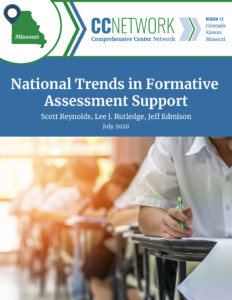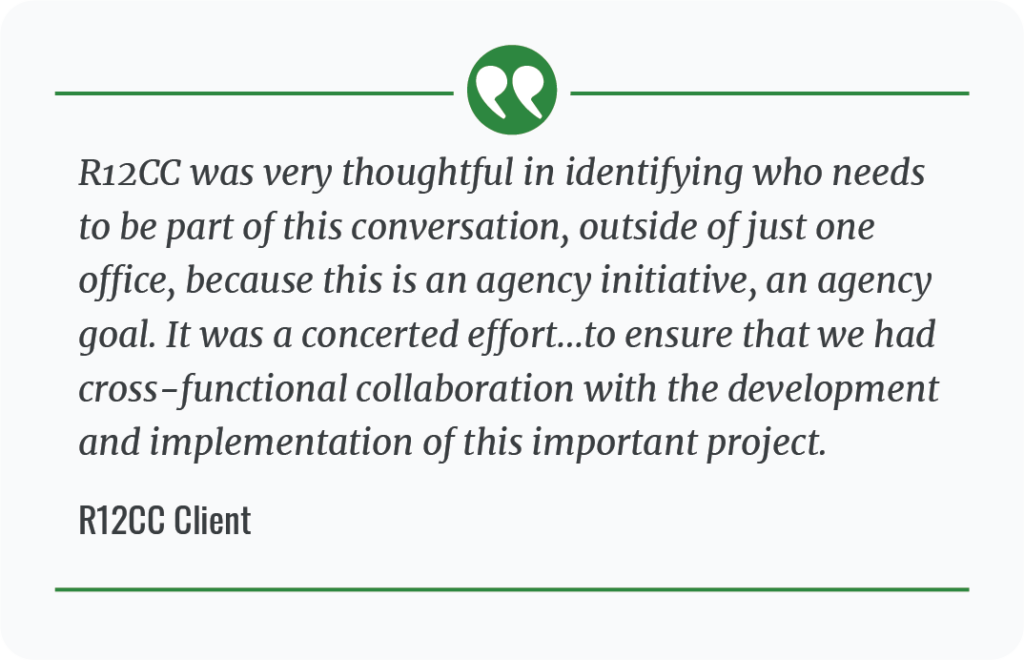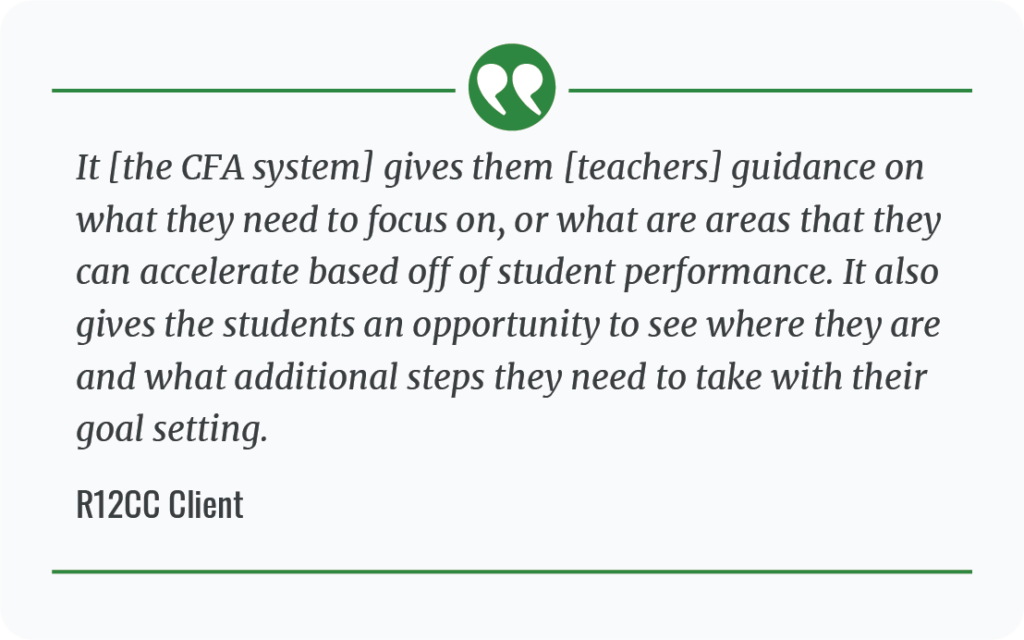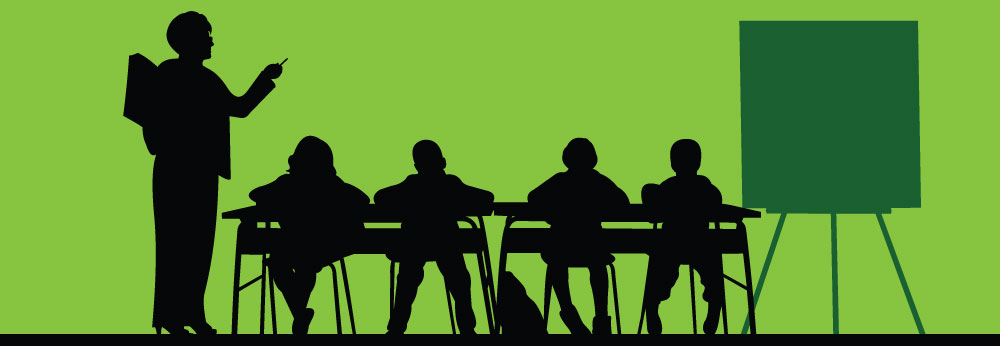Formative assessment is a planned, ongoing process that elicits and uses evidence of student learning to provide teachers with feedback that they can use to adjust learning strategies, goals, or next instructional steps.1
Research suggests that students who participate in formative assessment perform better on measures of academic achievement than students who do not.2 To raise school and systematic performance, teachers need access to high-quality, rigorous tools designed to provide timely and individualized feedback for student learning.
According to a report published in 2023 by the Missouri Department of Elementary and Secondary Education (DESE), 58% of third grade students are reading at only a basic or below basic level, based on 2022-2023 state assessment results.3
The Region 12 Comprehensive Center (R12CC), in collaboration with DESE, is working to implement a statewide common formative assessment (CFA) system, referred to as the Formative Assessment Builder. The CFA system will provide Missouri educators with equitable access to common formative assessments for student learning in the area of Grade 2 literacy as they prepare for the transition to 3rd grade instruction and high stakes assessments.
The CFA system is an online portal hosted by DESE that provides access to professional learning modules and supporting materials. The portal will store assessment items created, vetted, and uploaded by DESE. All Missouri teachers and administrators will have free, unlimited, and direct access to the system.
National Scan

Figure 1. National Trends in Formative Assessment Support
In its first year of work with DESE, R12CC scanned state educational agencies (SEAs) across the United States in search of best practices related to formative assessment (see Figure 1). The goal of the scan was to provide DESE with a national perspective of formative assessment trends at the SEA level, in support of its priority to put valuable student learning data in the hands of teachers to inform their instruction.
Based on information from the initial scan, R12CC generated a report that presented common themes in formative assessment support, a series of supports by content and grade area as well as by modality of professional learning, and illustrative examples. The report, shared with other states via the Comprehensive Center Network, also examined collaborative efforts to support formative assessment, as well as unique approaches from individual SEAs. The approaches, tools, and resources identified served as a guide for DESE and other states focused on enhancing formative assessment supports to measure and improve student learning.
Honing the Focus
Initially, the CFA system was envisioned to support all grades and content areas. However, it became apparent that this scope was too broad and would require more state resources than available to support it. Given the resources available and Missouri’s concurrent efforts to identify priority standards, technical assistance focused on narrowing the scope.
In 2022, Missouri Senate Bill 681 was signed into law. The bill placed a heavy emphasis on early literacy, authorizing the creation of an Office of Literacy and requiring each school district and charter school to provide reading success plans to ensure students develop sufficient literacy skills by Grade 3. To align with this new state legislation, DESE requested that work on the CFA system continue with a new focus on building literacy for students in kindergarten through Grade 3.
Prior to the passing of SB681, statewide summative assessment results in Missouri revealed a gap in reading proficiency when students reached Grade 3. Research shows that students who fail to master reading by the end of Grade 3 often struggle in later grades and are more likely to drop out.4 Adopting a proactive approach to addressing this issue, DESE further narrowed the focus of the CFA system to Grade 2 literacy.
Building Cross-Departmental Relationships and Capacity
Development of the CFA system would not have been possible without contributions from multiple departments within DESE. Early in the project, R12CC assisted DESE in a concerted effort to identify which departments needed to be a part of the process. The Office of College and Career Readiness, Office of Literacy, Office of Quality Schools, and Office of Special Education were all brought in and contributed to development efforts. In fostering these cross-departmental relationships, R12CC helped establish a culture of collaboration within DESE that proved invaluable to the process.
“R12CC was very thoughtful in identifying who needs to be part of this conversation, outside of just one office, because this is an agency initiative, an agency goal,” the SEA Client said. “It was a concerted effort…to ensure that we had cross-functional collaboration with the development and implementation of this important project.”
In addition to developing these cross-departmental relationships, R12CC also recognized the importance of having an executive lead within DESE spearheading the project. As the driving force behind the work, this champion coordinated with all the parties involved, helping maintain a collective focus on the goal.
Navigating Challenges
In the course of developing the CFA system, R12CC assisted DESE in overcoming various obstacles.
Weathering the Pandemic
A major challenge and impediment to progress was the COVID-19 pandemic. DESE staff reflected that it was difficult to get people to think long-term about instruction and assessment in the face of these urgent distractions. The staff, however, appreciated the patience of R12CC in the face of these challenges, noting that R12CC helped DESE continue to make progress and push the conversation forward.
Competing Priorities
While the development of the CFA system was a priority for DESE, it was by no means the only one. There were competing priorities for other early literacy work and staff that support similar but separate efforts. Despite these competing priorities, regular discussion and cross-departmental engagement enabled the project team to maintain focus on the initiative.
Staffing Changes
Similar to other SEAs, DESE experienced multiple staffing changes due to transfers, promotions, and retirements. One such change was the departure of an individual who had been the earliest and strongest proponent of the CFA system. Because R12CC worked to broaden support for the initiative through cross-departmental collaboration, work continued despite the loss of this key individual.
Lessons Learned
Addressing these challenges yielded valuable information that could benefit future projects.
Start Small
When launching a new initiative, it’s important to keep the initial scope small. Attempting to cover all content areas and grade levels would not have been possible with the resources available at the time. Furthermore, given the amount of cross-departmental collaboration that was required, a smaller scope made for more focused conversations.
Identify Leaders and Early Adopters
Having a champion behind an initiative makes all the difference. This is particularly true when faced with challenges that can cause distractions and hinder progress. A champion helps keep everything on track, continuing to push the work forward and ensuring that team members don’t lose sight of the goal.
Build Cross-Departmental Constituency
The more people behind an initiative, the stronger it is. Bringing in multiple departments and establishing these cross-departmental relationships created a broad base of support that provided stability. In addition, the multiple perspectives involved in the development yielded a far more comprehensive result.
Persist
Development requires momentum and keeping that momentum going may require gracefully applying pressure. There are going to be challenges and distractions along the way, but those can all be overcome by continuously supporting those involved, reminding them of the goal, and showing them the pathways forward.
Looking Ahead
The CFA system is an integral tool that will benefit both teachers in their instruction and students in their learning.
“It [the CFA system] gives them [teachers] guidance on what they need to focus on, or what are areas that they can accelerate based off of student performance,” the SEA Client said. “It also gives the students an opportunity to see where they are and what additional steps they need to take with their goal setting.”
By messaging and demonstrating the value of the CFA system, DESE hopes to see more students engaged in their own learning, conversations focused on formative assessment amongst teachers, and increased teacher use of the system. With more and more schools implementing formative assessment into their instructional practices, Missouri classrooms will hone the focus of how to accelerate learning in Grade 2 literacy.
Long-term, the cross-departmental collaboration and culture established within DESE will not only aid in expanding the CFA system to include additional content areas and grade levels, but also support other statewide efforts that affect multiple departments.
References
1 Council of Chief State School Officers. (2018). Revising the definition of formative assessment. https://ccsso.org/sites/default/files/2018-06/Revising%20the%20Definition%20of%20Formative%20Assessment.pdf
2 Klute, M., Apthorp, H., Harlacher, J., & Reale, M. (2017). Formative assessment and elementary school student achievement: A review of the evidence. (REL 2017–259). U.S. Department of Education, Institute of Education Sciences, National Center for Education Evaluation and Regional Assistance, Regional Educational Laboratory Central. https://ies.ed.gov/ncee/edlabs/regions/central/pdf/REL_2017259.pdf
3 Missouri Department of Elementary and Secondary Education. (2023, August). August 2023 report on the 2022-23 Missouri Assessment Program (MAP) grade-level and end-of-course preliminary statewide results in English language arts, mathematics, social studies and science. https://dese.mo.gov/media/pdf/august-2023-report-2022-23-missouri-assessment-program-map-grade-level-and-end-course
4 Regional Educational Laboratory (REL Midwest). (2018). What does the research say about the relationship between reading proficiency by the end of third grade and academic achievement, college retention, college and career readiness, incarceration, and high school dropout? U.S. Department of Education, Institute of Education Sciences. https://ies.ed.gov/ncee/rel/Products/Region/midwest/Ask-A-REL/10268

